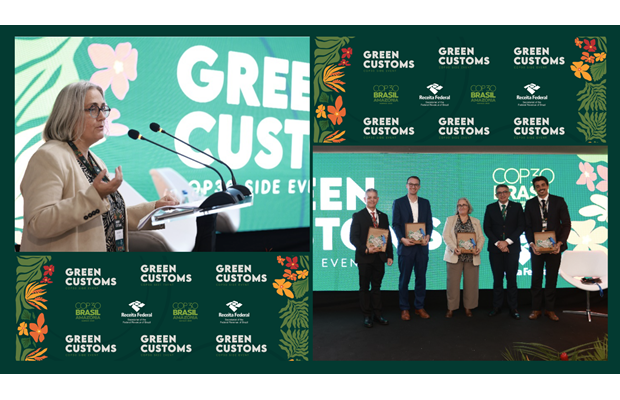The World Customs Organization (WCO) took part in the COP30 side event on Green Customs: Innovation and Sustainability, held in Manaus, Brazil, from 12 to 14 November 2025. Hosted by the Special Secretariat of the Federal Revenue of Brazil (RFB), the event brought together Customs administrations, international organizations, Brazilian enforcement agencies, and private sector representatives to explore how Customs can contribute to advancing global environmental objectives.
The WCO participated in two panel discussions — Combating Illicit Trade in Environmentally Sensitive Goods and Facilitating Sustainable Trade, Green Transition, and Customs Control Initiatives for Carbon-Intensive Goods. Both sessions underscored Customs’ essential role in combating illegal trade in environmentally sensitive commodities while facilitating legitimate green trade through balanced and practical approaches. As a key focus area in the WCO’s 2025-2028 Strategic Plan, this was a valuable opportunity to demonstrate the role of Customs by highlighting how Customs contribute to implementing Multilateral Environmental Agreements and national environmental policies, ensuring compliance, preventing and intercepting illegal trade in environmentally sensitive goods, and supporting governments in achieving sustainability objectives while maintaining efficient trade flows.
The WCO provided updates on the Green Customs Action Plan (GCAP) — its roadmap for embedding sustainability across Customs work. Structured around three dimensions — Being, Doing, and Innovating — the GCAP guides WCO and Customs administrations in reducing their environmental footprint, applying environmental measures, and adopting innovative enforcement and facilitation approaches. Among its deliverables, the Green Customs Assessment Tool (GCAT) is being finalized with support from the SECO-WCO Global Trade Facilitation Programme. Drawing on findings from the WCO Survey on Green Customs and Innovation, the tool provides a structured framework to help administrations assess their progress and identify areas for continuous improvement.
Capacity-building efforts were also highlighted at the event, including new WCO e-learning modules on identifying and classifying plastic and electronic waste and applying relevant enforcement measures. It was further emphasized that, to support these efforts, the Harmonized System (HS) plays a key role, enabling Customs to accurately classify goods and monitor trade in products with environmental impact.
Greening Customs operations themselves remains a priority, as even small improvements in resource management across administrations can collectively make a measurable difference. The WCO reaffirmed its commitment to assisting Members in integrating environmental objectives into their work, further strengthening the role of Customs in promoting sustainable trade and environmental protection.

